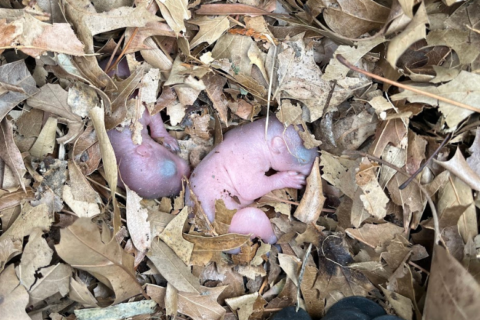An increase in the number of a highly contagious canine parvovirus is being reported by veterinarian offices in the D.C. region.
Veterinarian Ashly Smith, D.C.-area regional medical director for Bond Vet, said over the last month, her organization has seen more animals coming in with the illness.
“It’s a very, very contagious disease,” Smith said.
While Smith said she wouldn’t classify what she’s seeing as an outbreak, the increase in cases is concerning.
WTOP reached out to several other veterinarians who said they’re seeing more cases, but not all those contacted reported cases.
While the illness affects all dogs, puppies under four months old are most at risk, according to Smith. The reason for that is at four months, most dogs have received the initial three-shot dose of the parvo vaccine.
“If we have that gap before their vaccination series have started, or if the vaccination series aren’t completed, they’re just more at risk, they’re vulnerable,” Smith said.
She said it is possible for older dogs to catch it, but usually ones that come down with it have another underlying illness that’s taxing their immune system.
Dogs catch the illness through contact with an infected dog.
Also, contaminated objects such as leashes, collars, food and even water bowls can pass on the virus. Sniffing, licking or eating infected poop can also lead to an animal coming down with the virus.
Parvo can also transfer to a dog from a human.
“If we’re holding a sick puppy and then we hold a healthy puppy, we can transfer the virus that way, too. Which is why, in the hospital, when we’re treating them, we are actually gowned in head-to-toe PPE because we know how dangerous and contagious it is,” Smith said.
Some of the symptoms of the illness include lethargy, loss of appetite, abdominal pain, bloating, fever, low body temperature, diarrhea, bloody stool and vomiting.
“They’re just really not looking right,” Smith said.
While survival with treatment is high, the virus can be deadly in some animals.
Smith said many of the cases they are seeing start with diarrhea. With more severe cases, Smith said neurological issues such as seizures are possible.
Anyone who believes their dog could have the illness should get their animal checked out. While there is not a drug that kills the virus, veterinarians can provide treatments that help the dog’s body fight off the illness.
“The scary part with parvovirus is once it hits them, within two to three days, if they’re not seen immediately, it can be fatal, they can die from it,” Smith said.
Prevention is key and one of the best ways to protect a dog is to make sure the animal’s parvo vaccination is up to date, which includes boosters every one to three years after the initial shots.
“It’s as simple as just making sure that they’re getting the proper vaccinations at that young age to make sure they’re well protected,” Smith said.
Also, dog parents should keep their animals away from the feces of other dogs while outside. People who handle sick animals should not handle other dogs without changing their clothes and really washing their hands.
Smith said a sick puppy can spread the virus for up to six weeks in their feces, and the virus can last in the environment for two months or more.
If an animal has the illness, it should be kept away from other animals until it is better. Any areas possibly contaminated by an infected dog should be disinfected with bleach solution, Smith said, because normal household cleaners won’t do.
As for what is fueling the increase in cases, Smith said that is unclear, but she suspects it could be cases of dog owners acquiring their dog online, from sellers or others who don’t provide a clear vaccination history for the animal.







